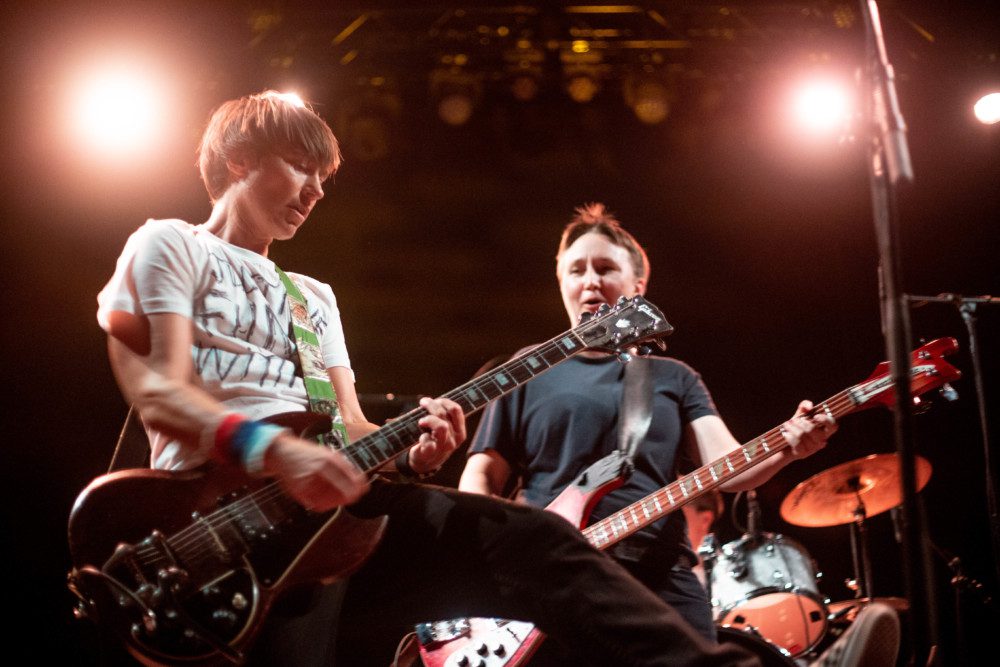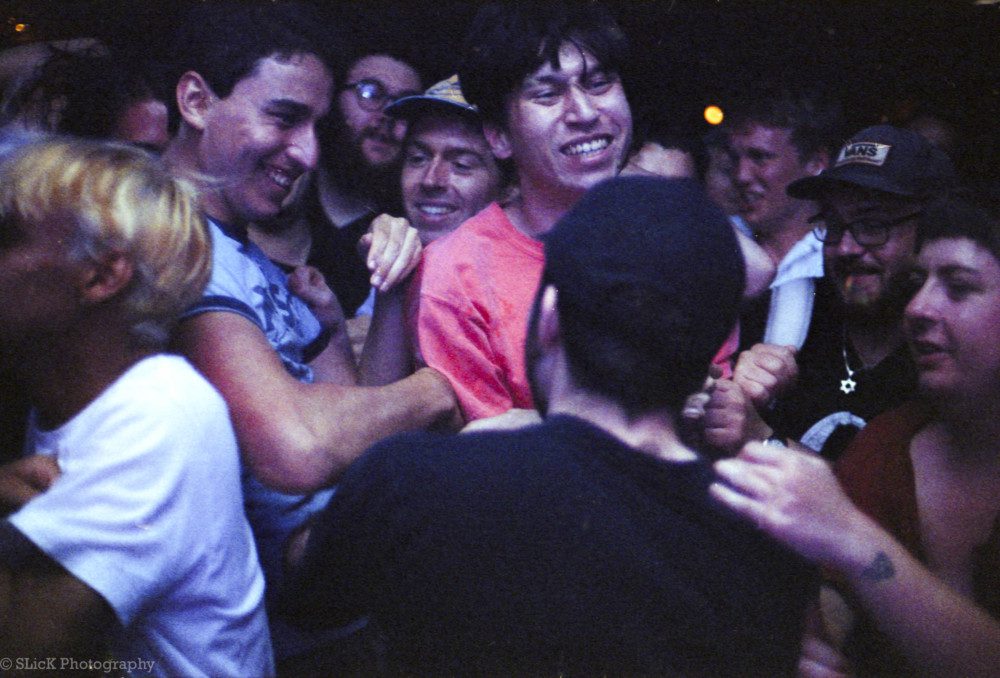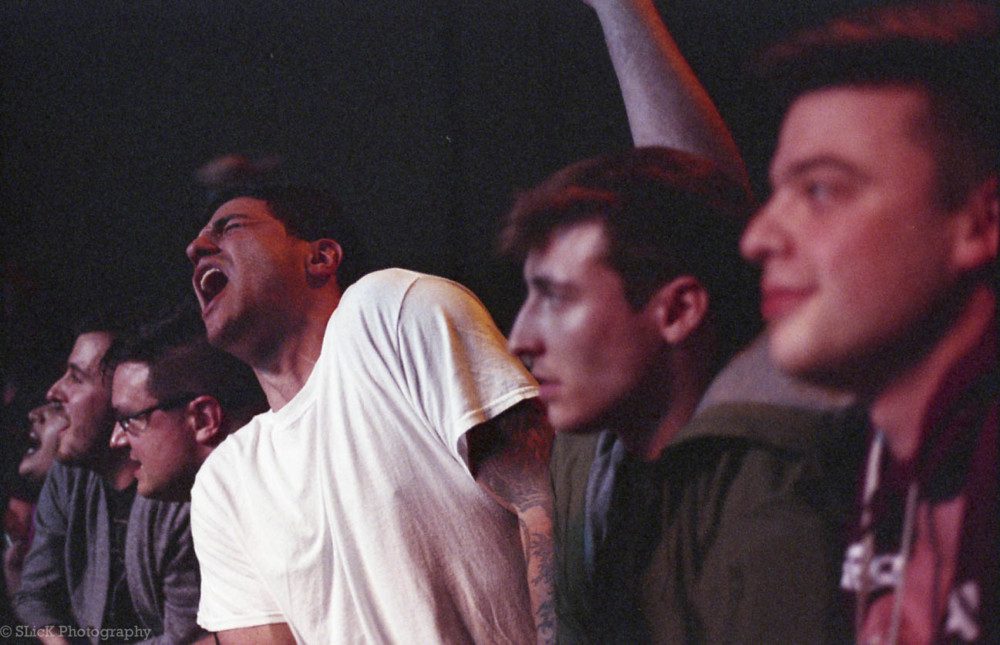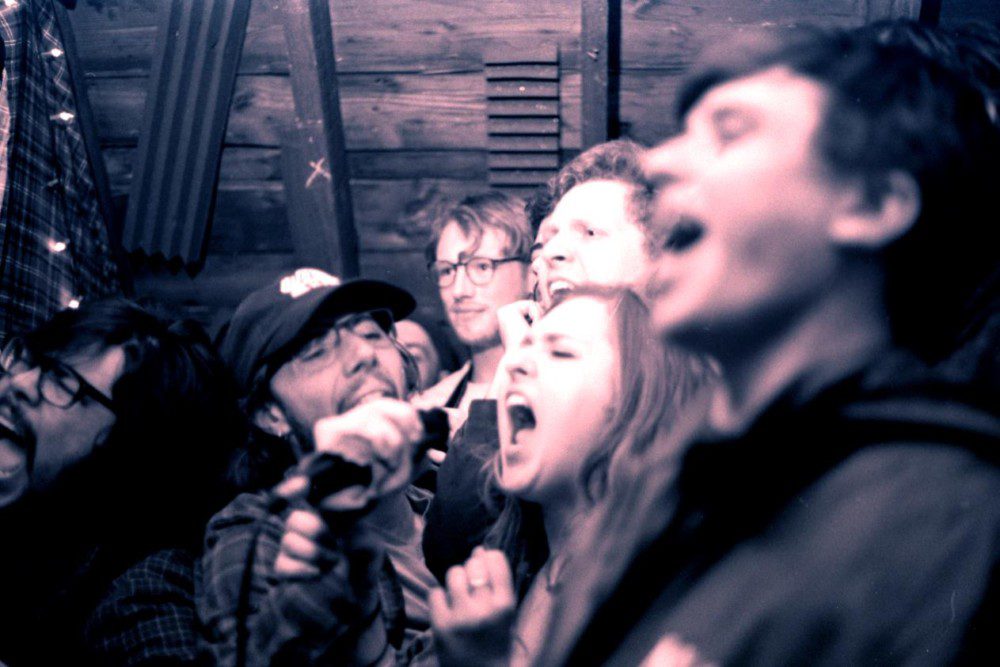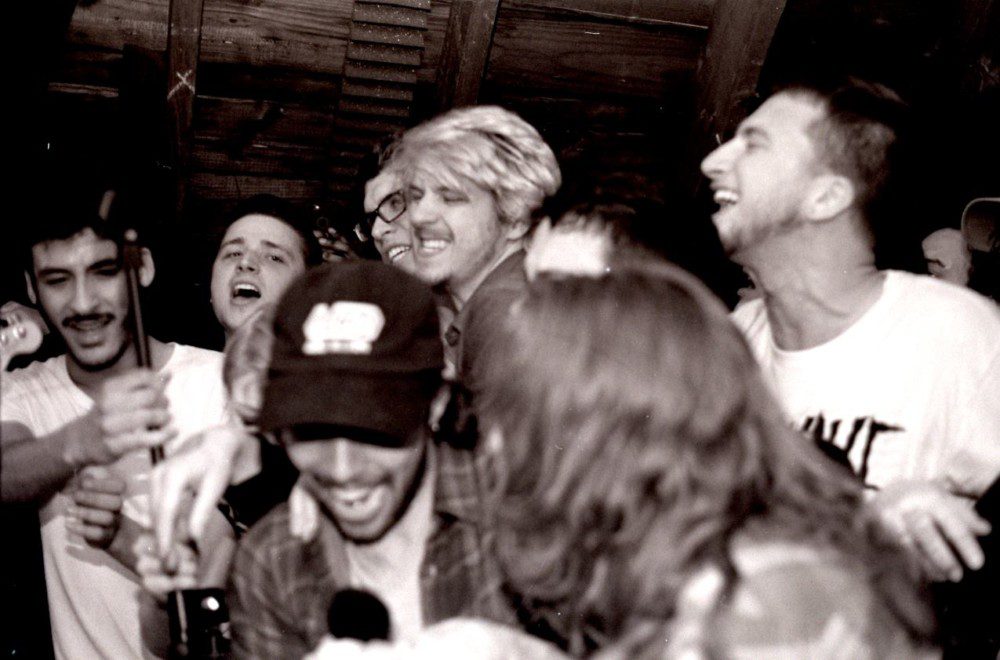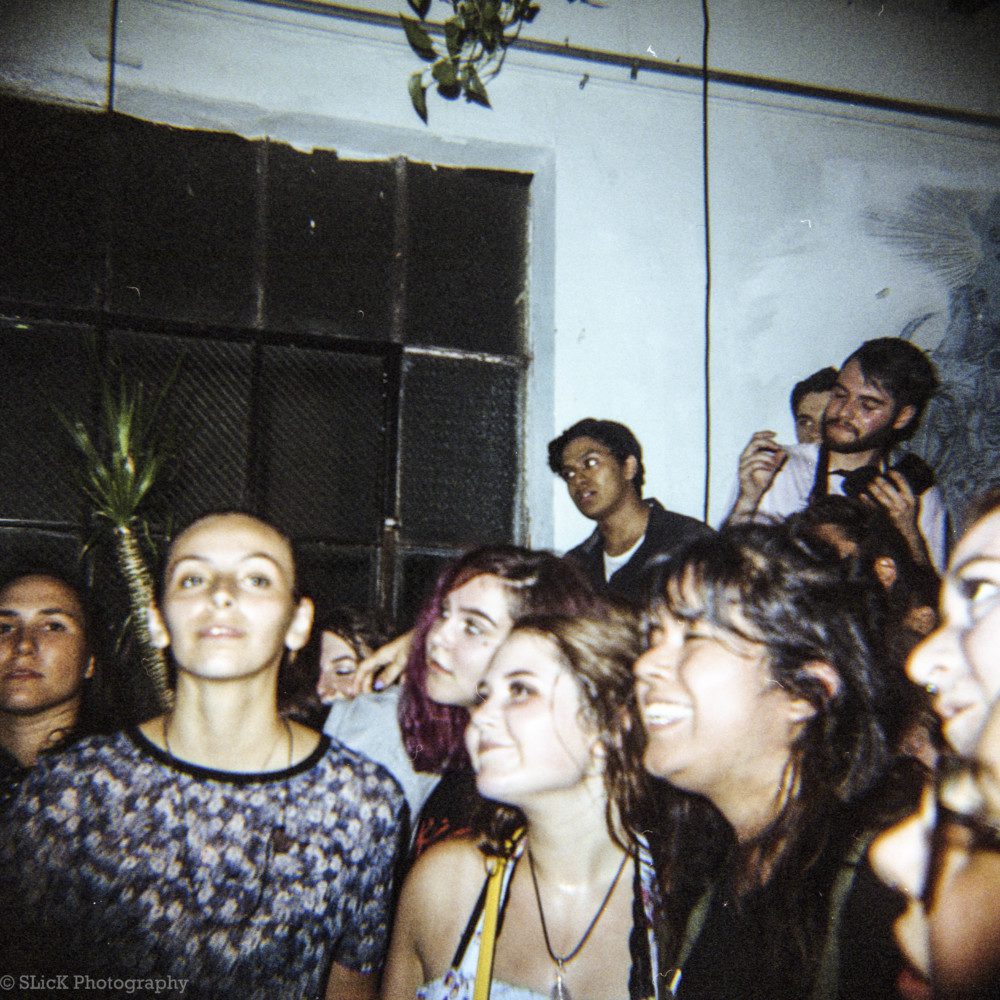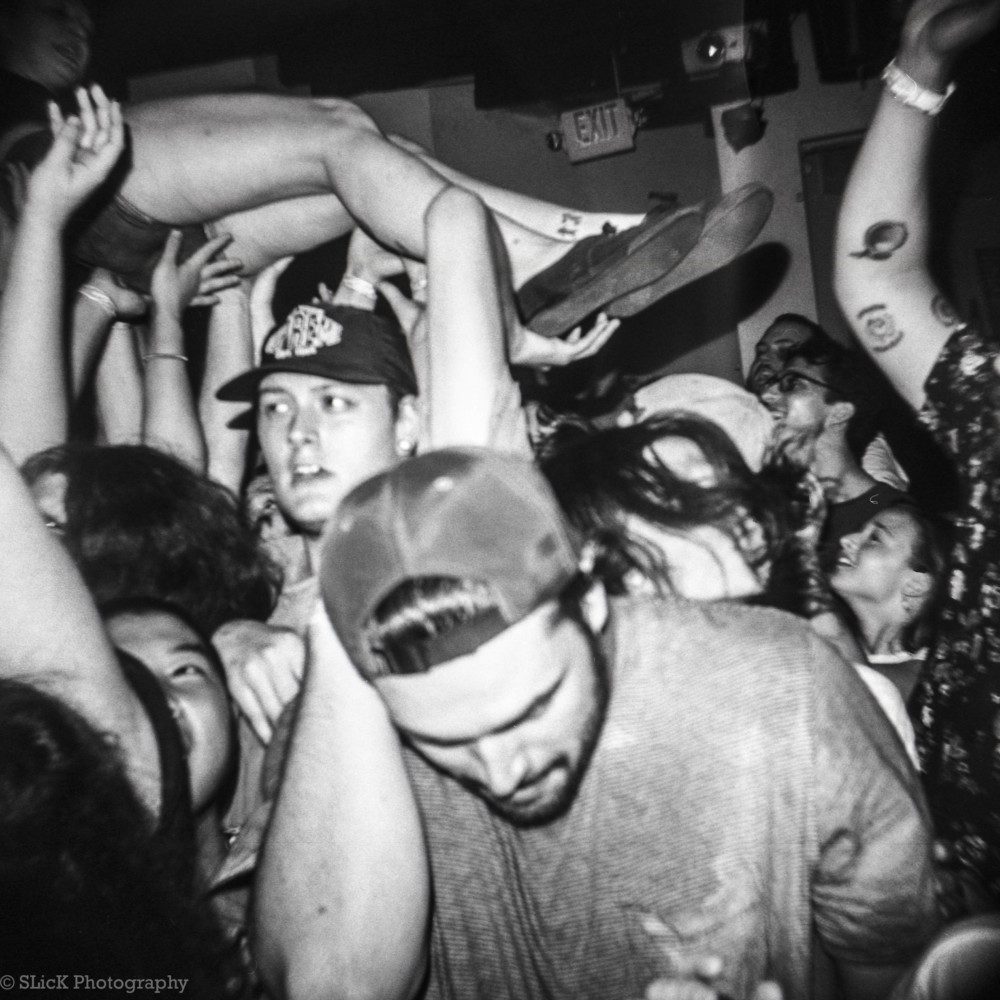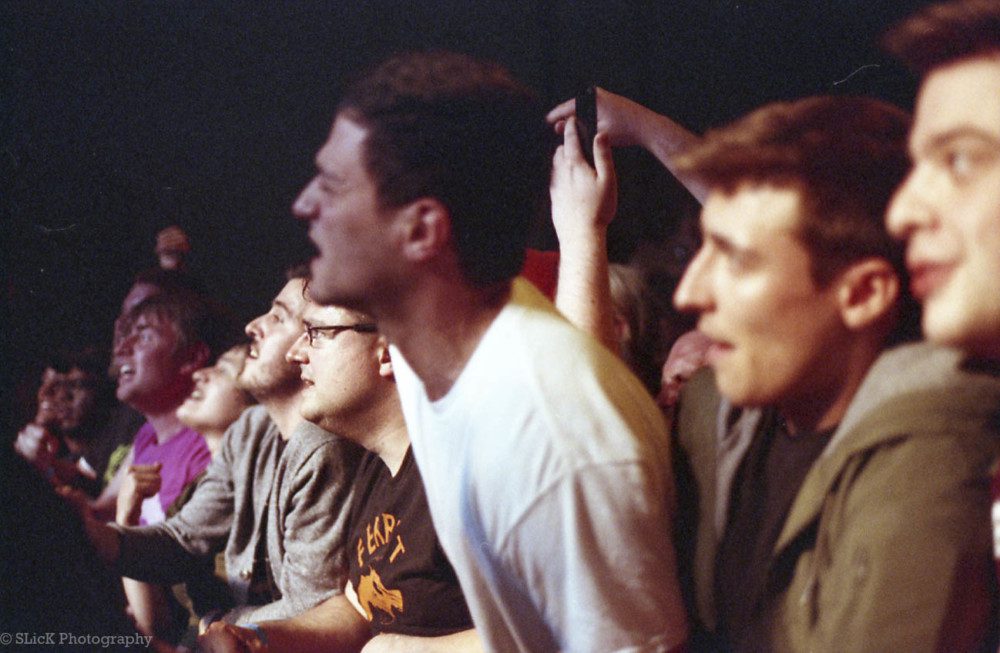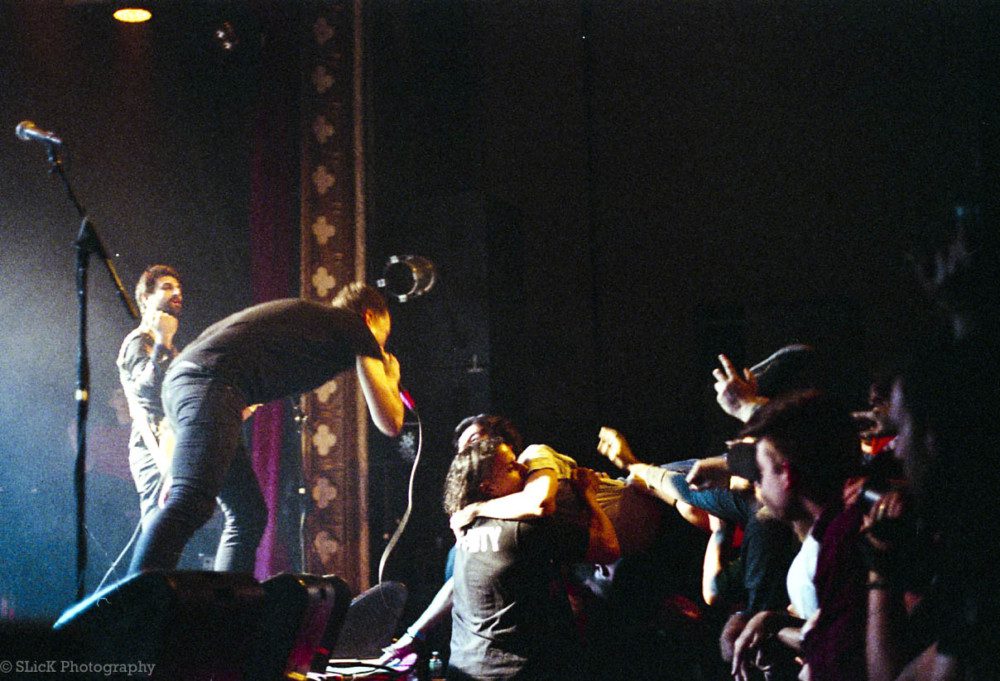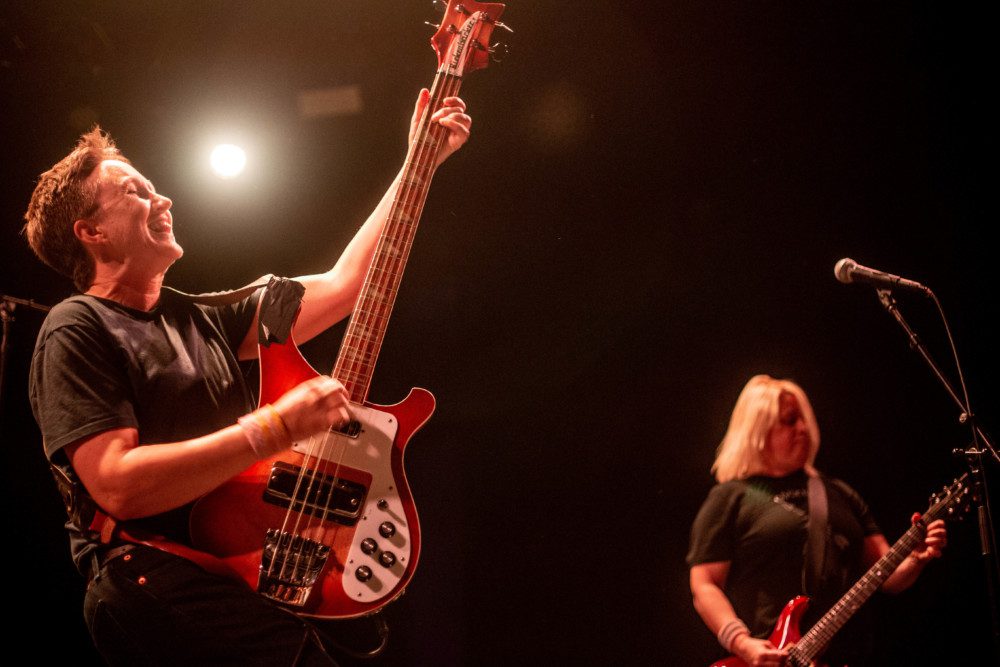
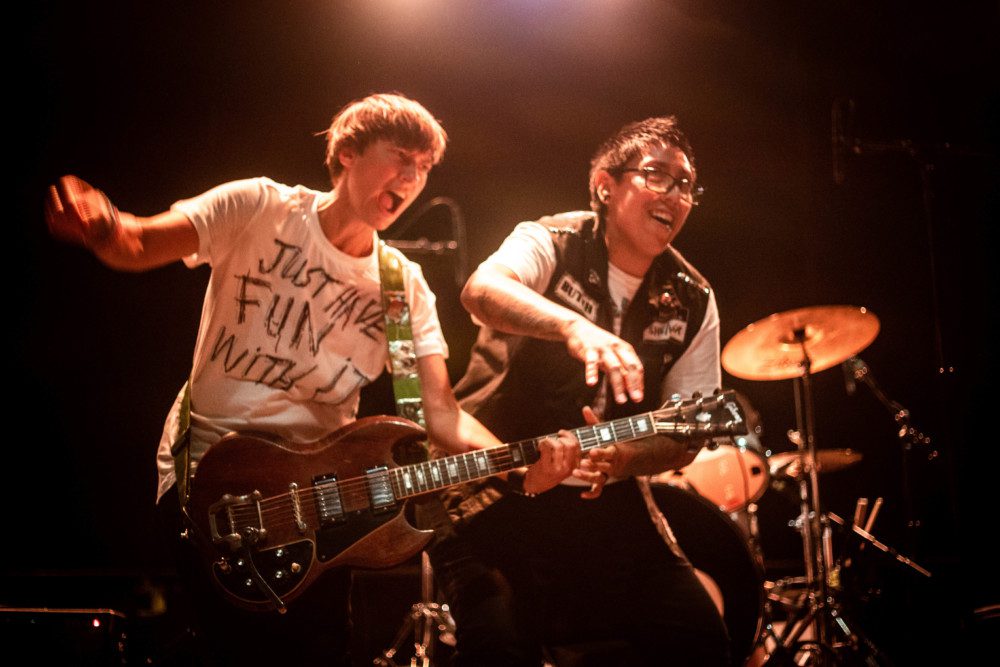
Before Team Dresch performs their 1995 anthem “Hate the Christian Right” at Philadelphia’s Union Transfer last week, singer and guitarist Jody Bleyle pulls a longtime fan from the crowd on stage.
As the queercore legends get ready to rip into the next song on their long-awaited reunion tour, the fan – Marlene – yells into the microphone, breathless: “I want you all to know… Dreams do come true.” Seconds later, she’s dancing on stage, playing air guitar back-to-back with Kaia Wilson, screaming the decades-old (yet still relevant) anti-authoritarian lyrics: “You never wanted to care/You kill, you kill, you kill!”
Reunion is in the air these days – there was Sleater-Kinney, Bikini Kill, and now, Team Dresch. As someone who spent the Riot Grrrl movement in diapers, I sometimes feel like the significance of these “triumphant returns” is lost on me. In the crowd, I listen to queer punks wax poetic about how it felt to discover Team Dresch – an all-lesbian punk band – in the ’90s, and how surreal it is to see them perform so many years later (only this time, they had to pay for babysitters). Whether you’re an old fan or a newbie, Team Dresch shreds – but now, a week after the show, I’m most affected by how it felt to watch Marlene’s “dream” come true – to see someone derive so much pure joy from the love of music.

I find myself feeling jaded these days, which is worrisome, because I’m only as old as Team Dresch’s second record, Captain My Captain (1996). I work at an art museum – something I’ve dreamed of for all of my life – yet, something feels off when I listen to my coworker tell me about her exciting visit to another gallery last weekend.
“Do you ever get tired of going to museums?” I ask her. “Since, you know, we spend so much time in one?”
“Oh, god no,” she says.
It’s not that I’ve lost my passion (just recently, a Bruce Naumann sculpture made me openly weep). It’s just that the older I get, I find myself less excited about the things that I love so fiercely. I’m terrified. I used to line up outside of concert venues hours early, yet now, going to shows can feel like a chore, no matter how much I still do – and always will – love music.
This is on my mind when Des Ark opens the show, reluctantly coming out of a sort-of-retirement as an homage to Team Dresch, a band that frontperson Aimée Argote credits with “saving [her] life.”
After years of touring – pushing through the physical and mental toll of being a full-time punk musician – Argote woke up one day in 2016 and realized she was burnt out. She tells IndyWeek, “I sat up and was like, it’s gone. It’s gone. It’s gone. That thing that you have inside of you that says, go to work, make music, do your thing. There’s nothing there.” Despite leaving the precarious, unrewarding lifestyle of punk rock behind, Argote’s appreciation for her longtime idols was still enough to get back on stage for one last mini-tour before she quits music for good.
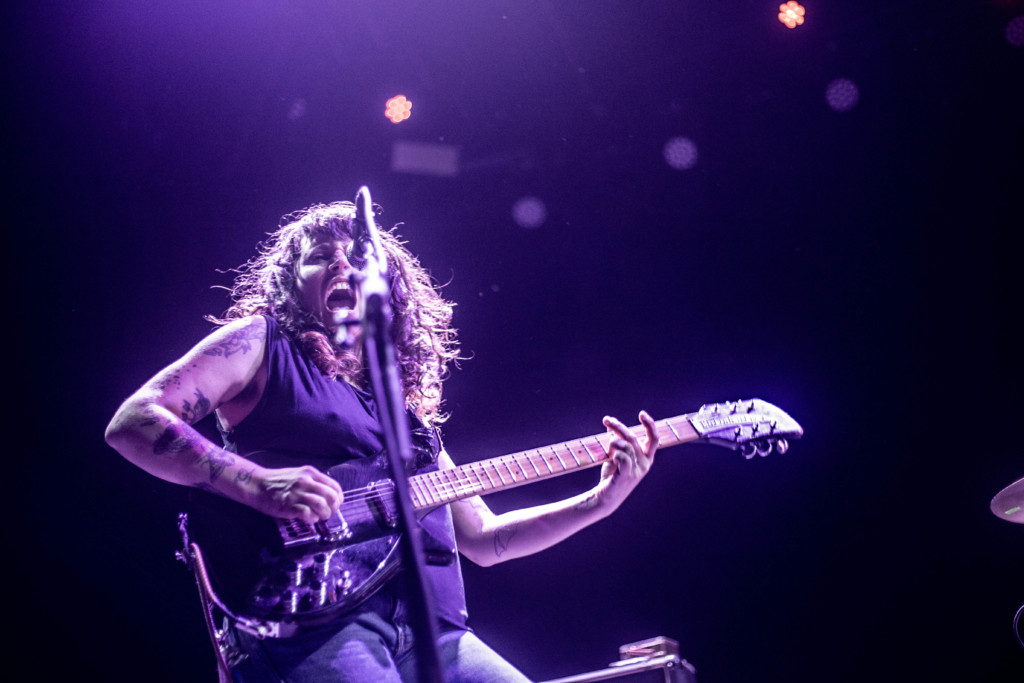
What must it be like to achieve “the dream” – to “make it” in music, develop a fan base, and perform night after night – only to discover that in this dream, something indiscernible feels wrong, and it’s kind of a relief to wake up in the morning? What does it mean that, for Marlene, the dream is to get on stage just once, yet for Aimée, living the same dream night after night isn’t as glorious as it seems? Is our collective dream – of spending day after day surrounded by our passions – one that deteriorates as you approach it, like when you get to the best part of your dream, only to wake up suddenly?
During Des Ark’s set, Aimée Argote takes a moment to preface “Ashley’s Song,” a song about processing a sexual assault. The crowd is silent as Argote explains the pain of telling people what happened. Then, a voice shouts from the back of the room: “We believe you.”
What’s so special about the bands who played that night – Team Dresch, Screaming Females, and Des Ark – is that, if you’re a fan, you’re probably not an asshole. So, if you showed up to their gig, you’re probably not an asshole. And maybe “the dream” isn’t so much about the music itself, but rather, the dream is to spend as much time as we can with people who aren’t assholes.
Jody Bleyle says: “Every night I feel like I get more inspiration to just continue… being alive, but also just doing the work of being a person in the world that is on the left, and a freak, and fighting fascism, and having to live in this world that we’re living in right now, going into the streets, fighting climate change… All the shit we have to do day to day when you’re not at a show.”
It’s tempting to view Des Ark’s farewell and Team Dresch’s reunion in contrast with one another, but they aren’t. Maybe the dream, like any progress, is not linear, nor is it static – I sympathize with Argote’s decision to leave music, especially given the misogyny that still infects even the most “alternative” of spaces. Even Bleyle openly admits: “Mental health issues drove me away from full-time rock.” Yet at the same time, even decades after their emergence, I feel immensely relieved to have a band like Team Dresch back on the road and recording a new album. We need more bands like Team Dresch (and Screaming Females, and Des Ark) in our lives to remind us of why we fell in love with music in the first place, and why every once in a while – even if you’re exhausted from the 9-to-5 grind – it’s worth it to get yourself out to a show.
When Marlene tells us, her fellow fans, that dreams come true, maybe she doesn’t mean that all of us will one day get to perform on stage with our favorite bands. Maybe the dream is more simple: to merely surround ourselves with the right people. And thank god that some bands have a knack for bringing the right people together.
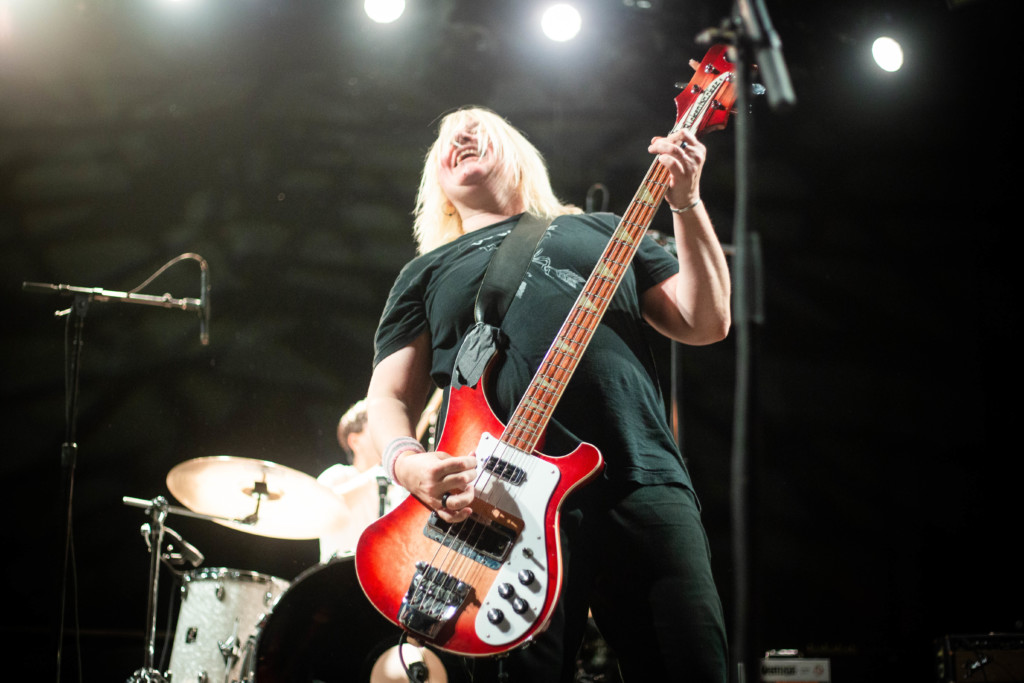
Find the rest of Audiofemme’s chat with Jody Bleyle and Donna Dresch below:
AF: What was your dream when Team Dresch began, and how has that changed after deciding to record another album after 23 years?
JB: I feel like, to me, the dream is similar to what it was when we started the band when we were younger, which was just… the need to find similar people, the need to find dykes to play music with, and not just any music, but the kind of music that I love. I think we all felt like we needed to find people that really, we could relate to, in terms of loving the same bands, in the way that you have that burning desire, but also dykes. It really felt like life or death. Like, “I don’t know how I’m going to move forward into life if I don’t find this.” And it doesn’t feel like that anymore, but it feels like the dream is the same in terms of just wanting to be with these people – wanting to play music with these people, having that be such a big part of being able to be happy, and feel good about yourself in the world. It’s definitely not about anything more than just wanting to connect with people, and being able to play shows, and being able to connect with everybody who comes to the show.
AF: Each band on the lineup – Team Dresch, Screaming Females, and Des Ark – really did seem to have a knack for connecting with the audience. It was such an emotional moment when Des Ark introduced “Ashley’s Song,” and she was talking about coming to terms with an assault, and someone shouted, “We believe you.”
JB: Let’s assume that most people in that room have people at this point in our lives who believe us, but to have that next level where you’re in a room with some people that you know, but mostly strangers, who you can have that same feeling of intimacy and connection with – it’s just so deeply powerful and comforting. I don’t know, every night I feel like I get more inspiration to just continue… being alive, but also just doing the work of being a person in the world that is on the left, and a freak, and fighting fascism, and having to live in this world that we’re living in right now, going into the streets, fighting climate change… All the shit we have to do day to day when you’re not at a show. It’s hard! It’s crazy!
AF: It’s tempting to say that all these bands from the Riot Grrrl era are reuniting because of who is President now, but I think they would have reunited either way, because there is always something to fight for.
JB: It’s all the same river, and we’re all in it together. It never ends. Sometimes, people will talk to us and be like, “Can you believe that we’re still fighting the Christian right?” but you know, it never ends – the struggles to be seen, and help other people… It’s been going on for thousands of years, and it will keep going on. It’s in the river.
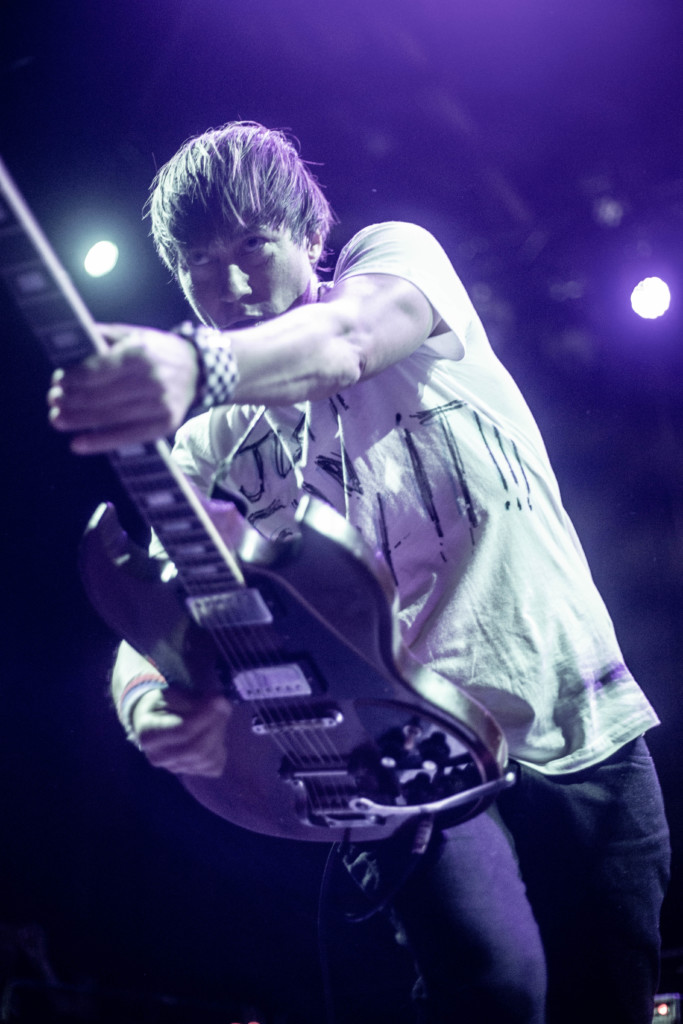
AF: Is it weird to go between a day job and punk rock?
DD: I like my day job! I go there every day!
JB: I like my day job too. I don’t mind the balance, like… your life might not be exactly as you planned that it would be or whatever, I don’t know. As I got older, I personally started to really feel like I really needed and appreciated having balance in my life, of different things. It’s always a question of figuring out how much I need at a minimum of which different things, and to just kind of keep it all in balance, you know? Like, I don’t have to play music with Team Dresch every day of the year, but if I didn’t play at all, I’d be really sad. But I like having my day job too, because, I don’t know, when I was only playing rock, it drove me over the edge. I’d already had two surgeries from rock music by the time I was 26, and I was like, “Whoa, I’m not going to make it!” And I have kids, and I really appreciate being home with them. I think it would be really hard. Even in my other job, I don’t choose to travel, so I feel like I have a good balance going, and I think a lot of people as they get older appreciate that balance, because there’s always going to be more than one thing in your life. Although, at that age, I do remember being like… You just give your life to music and nothing else matters. Your health doesn’t matter, your girlfriend doesn’t matter, it doesn’t matter whether you have kids… It doesn’t matter if you die by the time you’re 29. Nothing matters but writing the next song. But then you’re like, you know what else is fun? Buying a down comforter and having a really cozy bed.
AF: Full-time rock is hard!
JB: Mental health issues drove me away from full-time rock.
AF: Was it difficult to bring the band back together?
DD: We hang out all the time anyway. This is my family. If I need to talk to my best friend, I call Jody. We get together, like, one of us has an idea like, “I want to play in Brazil,” and once a year, every other year, we learn the songs again and play them.
AF: Now that you’re recording a new album, what have you learned since the last record you released?
JB: We learned a lot of things that you just learn as you get older. We have to be patient with each other, we have to practice with each other and understand who we are and respect each other. We have to be better with our communicating, we have to be better with our boundaries, and we have to learn things that lucky people learn when they’re 14, but we learn when we’re in our mid-to-late 30s, possibly 40s. Of course, taking a break, you appreciate it more – because we don’t play full time, we don’t take it for granted. It’s so special to get to play these shows with people. It’s so incredible to hear people sing songs you wrote, to have people give you the love they say you’ve given them… It’s incredible. We’re really lucky.
